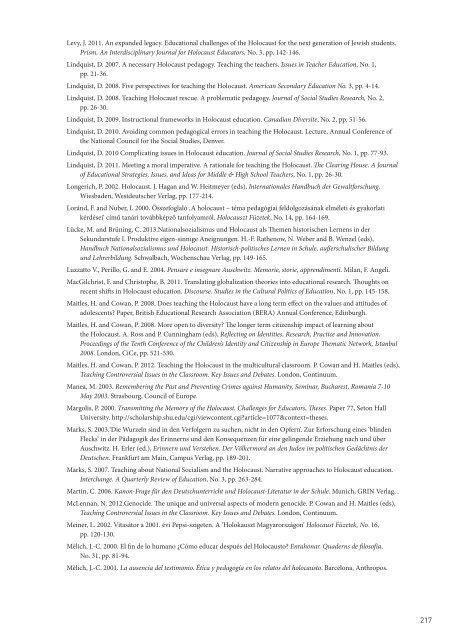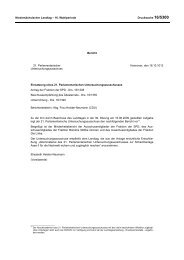228776e
228776e
228776e
Create successful ePaper yourself
Turn your PDF publications into a flip-book with our unique Google optimized e-Paper software.
Levy, J. 2011. An expanded legacy. Educational challenges of the Holocaust for the next generation of Jewish students.<br />
Prism. An Interdisciplinary Journal for Holocaust Educators, No. 3, pp. 142-146.<br />
Lindquist, D. 2007. A necessary Holocaust pedagogy. Teaching the teachers. Issues in Teacher Education, No. 1,<br />
pp. 21-36.<br />
Lindquist, D. 2008. Five perspectives for teaching the Holocaust. American Secondary Education No. 3, pp. 4-14.<br />
Lindquist, D. 2008. Teaching Holocaust rescue. A problematic pedagogy. Journal of Social Studies Research, No. 2,<br />
pp. 26-30.<br />
Lindquist, D. 2009. Instructional frameworks in Holocaust education. Canadian Diversite, No. 2, pp. 51-56.<br />
Lindquist, D. 2010. Avoiding common pedagogical errors in teaching the Holocaust. Lecture, Annual Conference of<br />
the National Council for the Social Studies, Denver.<br />
Lindquist, D. 2010 Complicating issues in Holocaust education. Journal of Social Studies Research, No. 1, pp. 77-93.<br />
Lindquist, D. 2011. Meeting a moral imperative. A rationale for teaching the Holocaust. The Clearing House. A Journal<br />
of Educational Strategies, Issues, and Ideas for Middle & High School Teachers, No. 1, pp. 26-30.<br />
Longerich, P. 2002. Holocaust. J. Hagan and W. Heitmeyer (eds), Internationales Handbuch der Gewaltforschung.<br />
Wiesbaden, Westdeutscher Verlag, pp. 177-214.<br />
Loránd, F. and Nuber, I. 2000. Összefoglaló ‚A holocaust – téma pedagógiai feldolgozásának elméleti és gyakorlati<br />
kérdései‘ című tanári továbbképző tanfolyamról. Holocauszt Füzetek, No. 14, pp. 164-169.<br />
Lücke, M. and Brüning, C. 2013.Nationalsozialismus und Holocaust als Themen historischen Lernens in der<br />
Sekundarstufe I. Produktive eigen-sinnige Aneignungen. H.-F. Rathenow, N. Weber and B. Wenzel (eds),<br />
Handbuch Nationalsozialismus und Holocaust. Historisch-politisches Lernen in Schule, außerschulischer Bildung<br />
und Lehrerbildung. Schwalbach, Wochenschau Verlag, pp. 149-165.<br />
Luzzatto V., Perillo, G. and E. 2004. Pensare e insegnare Auschwitz. Memorie, storie, apprendimenti. Milan, F. Angeli.<br />
MacGilchrist, F. and Christophe, B. 2011. Translating globalization theories into educational research. Thoughts on<br />
recent shifts in Holocaust education. Discourse. Studies in the Cultural Politics of Education, No. 1, pp. 145-158.<br />
Maitles, H. and Cowan, P. 2008. Does teaching the Holocaust have a long term effect on the values and attitudes of<br />
adolescents Paper, British Educational Research Association (BERA) Annual Conference, Edinburgh.<br />
Maitles, H. and Cowan, P. 2008. More open to diversity The longer term citizenship impact of learning about<br />
the Holocaust. A. Ross and P. Cunningham (eds), Reflecting on Identities. Research, Practice and Innovation.<br />
Proceedings of the Tenth Conference of the Children’s Identity and Citizenship in Europe Thematic Network, Istanbul<br />
2008. London, CiCe, pp. 521-530.<br />
Maitles, H. and Cowan, P. 2012. Teaching the Holocaust in the multicultural classroom. P. Cowan and H. Maitles (eds),<br />
Teaching Controversial Issues in the Classroom. Key Issues and Debates. London, Continuum.<br />
Manea, M. 2003. Remembering the Past and Preventing Crimes against Humanity, Seminar, Bucharest, Romania 7-10<br />
May 2003. Strasbourg, Council of Europe.<br />
Margolis, P. 2000. Transmitting the Memory of the Holocaust. Challenges for Educators, Theses. Paper 77, Seton Hall<br />
University. http://scholarship.shu.edu/cgi/viewcontent.cgiarticle=1077&context=theses.<br />
Marks, S. 2003.‘Die Wurzeln sind in den Verfolgern zu suchen, nicht in den Opfern‘. Zur Erforschung eines ‘blinden<br />
Flecks‘ in der Pädagogik des Erinnerns und den Konsequenzen für eine gelingende Erziehung nach und über<br />
Auschwitz. H. Erler (ed.), Erinnern und Verstehen. Der Völkermord an den Juden im politischen Gedächtnis der<br />
Deutschen. Frankfurt am Main, Campus Verlag, pp. 189-201.<br />
Marks, S. 2007. Teaching about National Socialism and the Holocaust. Narrative approaches to Holocaust education.<br />
Interchange. A Quarterly Review of Education, No. 3, pp. 263-284.<br />
Martin, C. 2006. Kanon-Frage für den Deutschunterricht und Holocaust-Literatur in der Schule. Munich, GRIN Verlag, .<br />
McLennan, N. 2012.Genocide. The unique and universal aspects of modern genocide. P. Cowan and H. Maitles (eds),<br />
Teaching Controversial Issues in the Classroom. Key Issues and Debates. London, Continuum.<br />
Meiner, L. 2002. Vitasátor a 2001. évi Pepsi-szigeten. A ‘Holokauszt Magyarországon’ Holocaust Füzetek, No. 16,<br />
pp. 120-130.<br />
Mèlich, J.-C. 2000. El fin de lo humano ¿Cómo educar después del Holocausto Enrahonar. Quaderns de filosofía,<br />
No. 31, pp. 81-94.<br />
Mèlich, J.-C. 2001. La ausencia del testimonio. Ética y pedagogía en los relatos del holocausto. Barcelona, Anthropos.<br />
217




